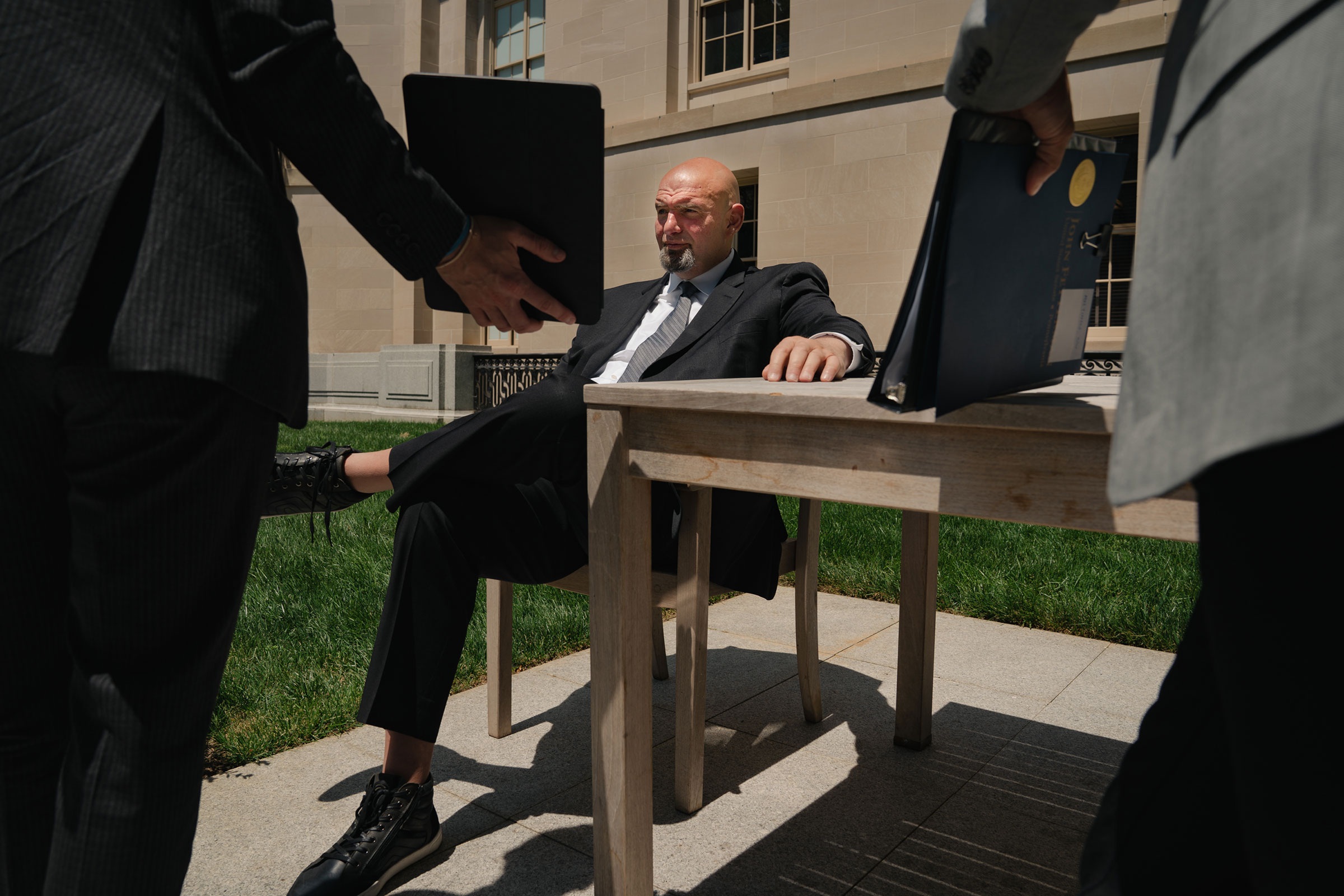When he looks back on the past year—a year in which he nearly died, became a U.S. Senator, and nearly died again—it is the debate that John Fetterman identifies as the breaking point.
“The debate lit the mitch,” he says, then shakes his head in frustration and tries again. The right word is there in his brain, but he struggles to get it out. “Excuse me, that should be lit the mitch—” He stops and tries again. “Lit the match,” he says finally.
Oct. 25, 2022: the date is lodged in his mind. “I knew I had to do it,” he tells me. “I knew that the voters deserve to have what, what the stroke has done to me—transparency that way.” As soon as it was over, he knew it had not gone well. “I knew at that moment that I was going to be considered—consider myself—like, a national embarrassment,” he says. And then the darkness came.
The Pennsylvania Democrat is sitting behind a big wooden desk in his sparsely furnished Senate office. His 6-ft. 8-in. frame is clad in a white hoodie, gray sweat shorts, and sneakers—a sartorial signature he has maintained despite Senate rules. (For most votes, Fetterman discovered, he can stand just off the Senate floor and give a thumbs-up or -down to the clerk, thereby avoiding having to put on a suit.) Surrounding us are three iPads propped up on stands—two facing him, one facing outward—that transcribe our conversation in real time, helping compensate for the auditory-processing difficulties brought by his stroke just over a year ago.
More from TIME
Fetterman has settled in to talk, through tears, about his treatment for and recovery from the severe depression that followed. In February, he checked into the neuropsychiatry unit at Walter Reed National Military Medical Center outside D.C., where he remained for more than six weeks. By the time he got there, he was a shell of himself—gaunt, listless, barely able to function. “I didn’t think I could be fixed,” he says. He didn’t actively contemplate suicide, he tells me, but he would have welcomed death if it came. “If the doctor said, oh, by the way, you have six months left, I would have been like, OK, whatever,” he says. “That’s how bleak it was.” He considers himself lucky to have survived.
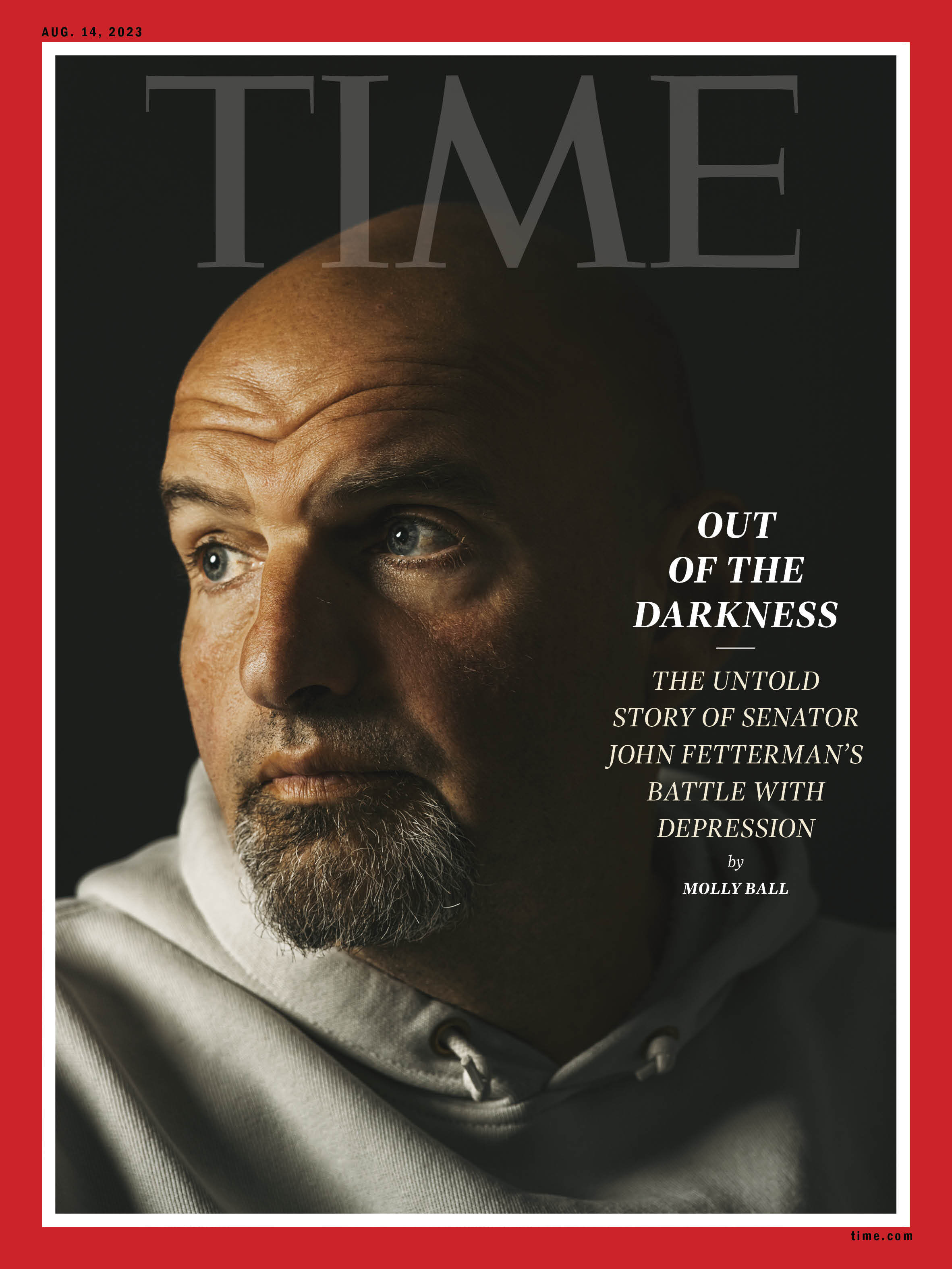
Buy a print of the John Fetterman cover here
Instead, Fetterman emerged transformed, he says, and has become an evangelist for the treatment he believes saved his life. This openness about a serious, ongoing mental-health ordeal has put Fetterman in uncharted territory for an American politician. A half-century ago, Senator Thomas Eagleton, selected as George McGovern’s running mate, was dropped from the Democratic presidential ticket when it emerged he had previously been hospitalized for depression. Since then, other politicians have been more open about mental illness, but typically in the past tense. “There’s been a transition in terms of stigma around these issues,” says Minnesota Democrat Tina Smith, who disclosed her youthful battle with depression in a Senate floor speech in 2019. “I was talking about my experiences when I was much younger. That’s very different from the leap of faith John has taken.”
When Fetterman set out to shatter that long-standing taboo, it was far from clear what the response would be. But he has been met, by and large, with an outpouring of goodwill, from colleagues and the public alike. Senators of both parties have lauded him. People come up to him on street corners to tell him he saved their life. On a May day that I interviewed him in Washington, a suit-jacketed Republican congressional staffer carrying a Chick-fil-A takeout bag approached Fetterman to thank him for talking about his struggles. As he sat on a park bench in Philadelphia recently, a 28-year-old Black woman pressed a handwritten note into his hands: “I just wanted to thank you for your bravery,” it read. “I have lived with Bipolar II for years. You have opened a door that has profoundly change [sic] the conversation in my household and community!”
For so many years, we have demanded our politicians be perfect—free of scandal, perfectly groomed, never a hair or a word out of place. To admit to being broken was to admit to being deficient. But Fetterman was never the kind of pol who put much stock in seeming perfect. And so he embarked on a high-stakes trust fall with the electorate of his diverse swing state, gambling that they would see him not as dangerously unstable but as recognizably human. It turned out that many people loved their broken Senator—not in spite of his brokenness but because of it.
The stroke left Fetterman’s cognitive abilities intact, according to his doctors, and in hours of interviews in D.C. and Pennsylvania—the most extensive he’s given since his treatment—his quick wit and grasp of policy were apparent. Though he may eventually recover full fluency with time and continued speech therapy, he sometimes struggles to express the words in his mind. But his meaning is clear. “My message is, I don’t care if you’re a Trumper, MAGA, or hard leftist, or anyone in between. Depression comes across the spectrum, and get help with it,” he tells me. “It’s not a Democratic Senator from Pennsylvania saying this. No. I’m just a husband and a father, somebody that was suffering from depression and got help—”
Here his voice breaks; he wipes his eyes, takes a moment to compose himself. He has turned sideways and curled up in his chair, as if trying to shrink inside himself. “—Before it was too late,” he finally says. “Before some things could have—damage that can’t be undone. And I would just implore anybody to get help. Because it can work. It worked. And I’m so grateful.”
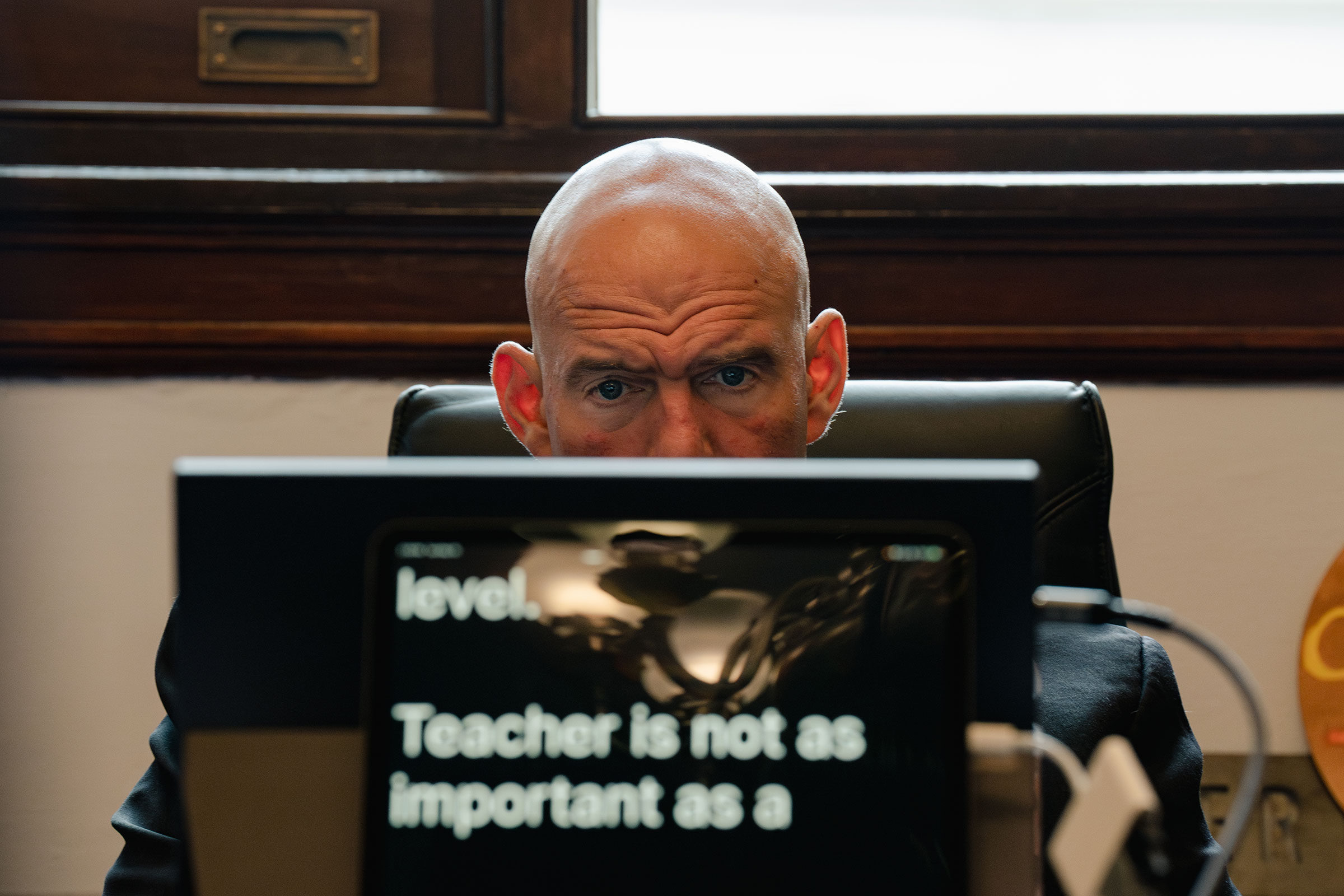
The people closest to Fetterman always knew there was a darkness in him. “John was always a sad person, and that was OK,” says his wife Gisele Barreto Fetterman. “He’d be like, ‘I’m not too sad, you’re too happy.’ He was just very empathetic, I think, and he carried the pain of so many. I thought of him as melancholic—I always loved Abraham Lincoln, and historians would call him melancholy, which we later learned was really clinical depression. And I thought, oh, he’s my Abraham Lincoln. It wasn’t something I wanted to change about him.”
Born to working-class teenage parents in Reading, Pa., Fetterman, 53, grew up upper-middle-class in York after his father found success in the insurance industry. He played offensive tackle at Albright College, his dad’s alma mater, then got an M.B.A. at the University of Connecticut, planning to follow his Republican father into the family business. But when Fetterman was 24, his best friend died in a car accident, prompting a round of soul-searching. He signed up for AmeriCorps, which sent him to work with low-income kids in Pittsburgh. After earning a degree from Harvard’s Kennedy School, he returned to western Pennsylvania to run a G.E.D. program in Braddock, a majority-Black former steel town.
Braddock’s population had declined precipitously; poverty and violence were rampant. Fetterman ran for mayor in 2005 on a reform platform, beating the incumbent by a single vote in the Democratic primary. As mayor, he turned the town into a showcase for hipster urban renewal—art studios, organic gardens—with help from a foundation funded partly by his father. He tattooed the local ZIP code, 15104, on one big forearm; on the other, he inked the dates of every murder in Braddock during his tenure.

Irreverent, unpretentious, and progressive, the big man with the soft heart was catnip to coastal media, featured in glossy magazine profiles and on thought-leader panels. He was re-elected three times. In 2007, a formerly undocumented Brazilian immigrant, Gisele Barreto Almeida, wrote Fetterman a letter saying she admired his efforts. He invited her to visit Braddock. They fell in love and were married a year later.
Fetterman made a bid for Senate in 2016, losing the Democratic primary to a conventional candidate preferred by the Democratic establishment who went on to lose the general election. Two years later, he defeated the incumbent lieutenant governor in the Democratic primary, earning a spot on the ticket with incumbent Governor Tom Wolf, a straitlaced former businessman. He refused the official residence that came with the job to remain in Braddock. Nor was he much for ceremonial glad-handing. Pennsylvania political insiders I asked about Fetterman’s tenure described him as a “loner” and a “grump.”
The lieutenant governor has few official duties, but Fetterman managed to make waves. He hung gay-pride and marijuana-leaf flags from his office balcony, even after the legislature banned the practice. In his role overseeing the pardon board, he pushed to dramatically increase commutations and pardons.
In February 2021, Fetterman announced he would again run for Senate. As 2022 dawned, he had a huge lead on his primary opponents. He was drawing big crowds and an avalanche of small-dollar donations. He would sometimes complain he didn’t feel well, but it never seemed serious.
On May 13, 2022—the Friday before the Tuesday primary election—Fetterman was in the car with Gisele, heading to a campaign event near Lancaster, when she noticed his face seemed to be drooping on one side. They drove straight to the hospital.

Four days later, Fetterman won the primary in a landslide. He spent the day of his victory anesthetized, having a pacemaker implanted in his heart. Before going under the knife, he recorded a video on his iPhone: a message to his children, in case he didn’t make it.
From the earliest days after the stroke, doctors said a full recovery was eventually possible. Staffers and family members could detect glimpses of the old John in the way he cracked jokes and intuited the rhythms of the race. In the months when the recovery kept him off the campaign trail, he personally directed a savagely funny social media blitz depicting celebrity doctor Mehmet Oz, his Republican opponent, as an out-of-touch carpetbagger.
Oz could have drawn on the soft-touch persona he’d honed on The Oprah Winfrey Show to compassionately address Fetterman’s health. Instead he mocked him. “If John Fetterman had ever eaten a vegetable in his life, then maybe he wouldn’t have had a major stroke,” a spokeswoman taunted. Later, Oz’s campaign aired ads showing Fetterman struggling to speak. The Senate campaign would eventually go down as history’s most expensive—a $300 million barrage of attacks that Fetterman believes exacerbated his depressive slide.
Returning to the trail in August, Fetterman would ask audience members to raise their hand if they or their close relatives had experienced serious health problems. “We’ve all been through this; I’m just doing it in the public eye,” he’d say. “And I have a doctor who’s making fun of me, and I hope you don’t have that in your life.” The strategy was a product both of necessity and of Fetterman’s political persona, says Joe Calvello, his communications director. “We made a bet on empathy—that people are going to relate,” Calvello says. It worked, he believes, because it was consistent with the Fetterman people knew. “His politics is about struggle,” Calvello says. “As mayor, as lieutenant governor, he was always about the forgotten places, the forgotten communities, the people left behind.”

Yet even many who sympathized wondered whether Fetterman was up to the job. The election’s lone debate loomed as the chance to prove himself. He prepared furiously. The format had never been a strength, but he did well enough in prep sessions that his camp felt optimistic.
Read More: How John Fetterman Beat Dr. Oz in Pennsylvania.
Fetterman now believes that debate will be remembered for decades as a debacle, like the time Dan Quayle couldn’t spell potato. His voice cracked; he stammered; he struggled to say his own name. When he managed to string words together, they were often the wrong ones. Asked to explain his support for fracking, which he had previously opposed, he stammered, “I do support fracking, and I don’t, I don’t—I support fracking, and I stand, and I do support fracking.” The reaction was brutal. Fetterman’s own polls predicted he would lose the election.
Two weeks later, he won by 5 points. Fetterman felt only numbness. Superstitious, and assuming it would take days to count votes, he hadn’t prepared a victory speech. “We’re all jumping up and down, and he’s just in disbelief,” his adviser Rebecca Katz recalls. “He went out and declared victory, and then we all went home.”
And the darkness descended.
The newly elected members of Congress were invited to an orientation in D.C. the week after the election. Gisele had to force her husband to go. “Think of the insanity of that,” Fetterman says. “I work for two years. And at the end of that, after nearly dying, after the most infamous debate in American politics, I was going to not show up for orientation. That’s what depression does.”
In news photographs from that event, Fetterman looks grim and uncomfortable. Surrounded by eager new lawmakers, his eyes are dim, his smile grudging. Colleagues remember wondering why he barely spoke or made eye contact.
Back in Braddock, the Senator wouldn’t get out of bed. Not for family meals at restaurants. Not for school activities for the three kids—Karl, 14; Grace, 11; and August, 9. At Thanksgiving, he came to the table for a few minutes, downed some food, and went back to bed, while Gisele and the children kept up the family tradition of watching Planes, Trains and Automobiles. At Christmas, Gisele handled Santa duty. “My family was really confused, my kids especially,” Fetterman says. “‘Why, Daddy, I thought you won. Why wouldn’t you be happier? What’s wrong with you?’ And I tried to explain to them that, oh, Daddy’s tired. But I could begin to sense that they were blaming themselves.” It still torments him, the helplessness and guilt that his children must have felt. “They realized that something was really wrong, and they started to get more and more scared,” he says. “And I couldn’t articulate to them, because I couldn’t really articulate it to myself at this point, what was going on.”
Read More: How John Fetterman Is Using Assistive Technology in the Senate.
While other newly elected lawmakers worked to get their offices up and running, aides struggled to get Fetterman to engage. “At first it seemed like he was just having a hard time getting out of campaign mode,” recalls Adam Jentleson, his chief of staff. “He was always talking about how Republicans would leap on every mistake—‘They’re going to kill me with that.’ I kept saying, you’re not running anymore, you don’t have to worry about it.” He became obsessed with a mini-scandal surrounding pollster Sean McElwee, who had done work for the campaign before resigning from his firm over his gambling on elections and ties to the disgraced crypto billionaire Sam Bankman-Fried. “At freshman orientation he was completely preoccupied with people talking behind his back,” Jentleson says. “I had to constantly reassure him that everything wasn’t a crisis.”
The winter was dark and cold. Fetterman’s D.C. apartment was in a basement. So was his temporary office suite in the Capitol. On Jan. 10, the New York Times journalist Blake Hounshell died by suicide at 44, leaving behind a wife and two young children. Fetterman had gotten to know Hounshell, a fellow stroke survivor, during the campaign. Hounshell had largely recovered from his stroke, but continued to suffer nerve pain that exacerbated the depression that had plagued him since he was a young man. (The physical and psychological effects of stroke frequently contribute to depression in survivors.) The news that Hounshell had taken his life hit Fetterman hard.
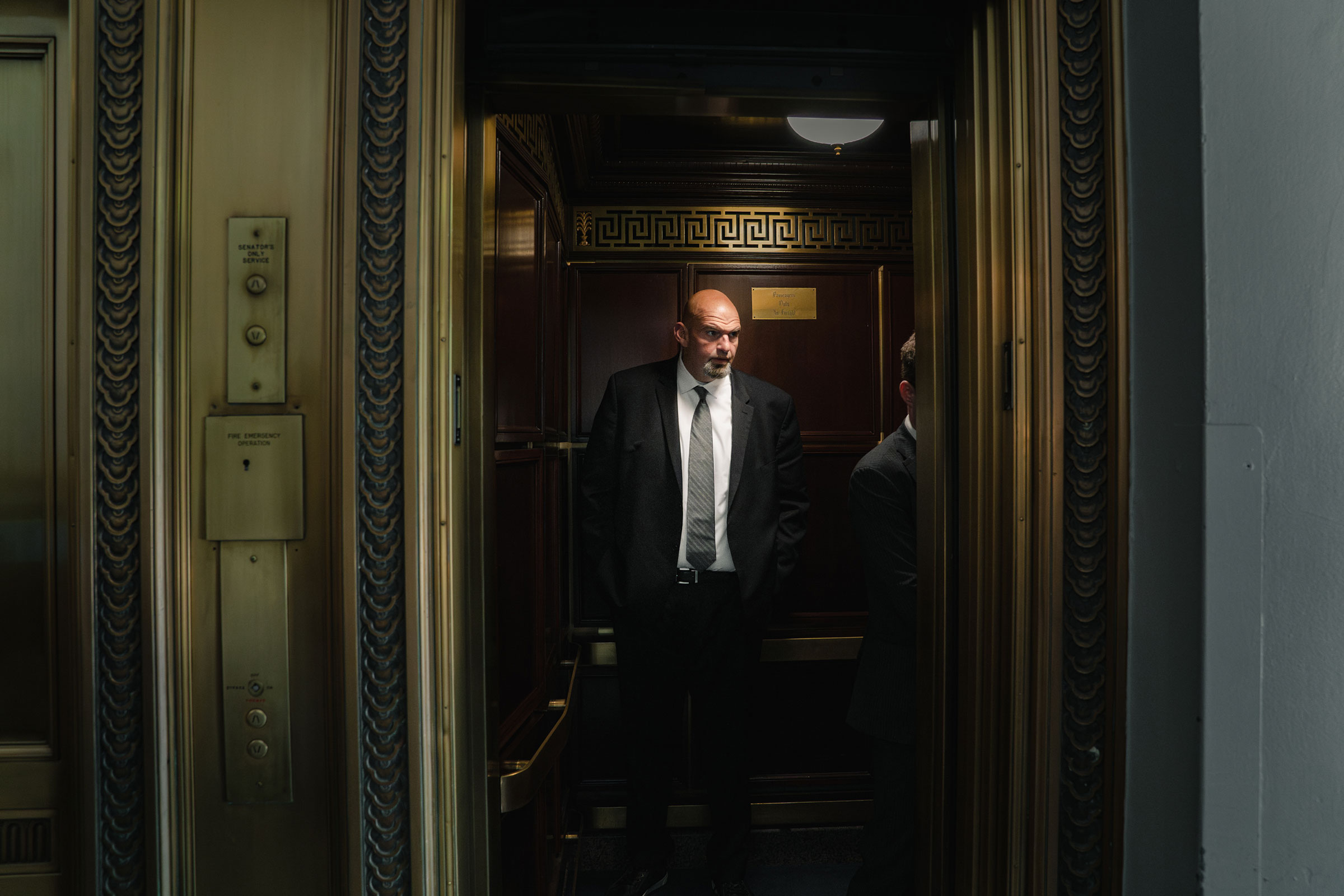
On Feb. 8, Senate Democrats held a retreat at the Library of Congress in D.C. Fetterman sat by himself and didn’t talk to anybody. “I was sitting with my wife at a table next to him, and it was clear he was not having a good day,” recalls Bob Casey, Pennsylvania’s senior Senator. “I attributed it to him being a little shy, which he is—you know, he’s not the most extroverted person. And he was still in the early stages of using the iPad to deal with his auditory-processing issues.”
Fetterman stumbled out of the retreat in a fog. Fearing he was having another stroke, his staff took him to George Washington University hospital, where he stayed for two nights, receiving fluids and getting tests. The following Monday, he consulted Congress’s attending physician, Brian Monahan, who diagnosed him with depression, recommended inpatient treatment, and began making arrangements for him to be admitted at Walter Reed. Finally, on Feb. 15, after pleading from staff and family members—Fetterman remembers it as an “intervention”—he agreed.
Jentleson and another Fetterman staffer, Bobby Maggio, escorted him out of the building. “I will always remember walking to his car parked a block away, thinking, ‘Please don’t change your mind,’” Jentleson recalls. “He’s a large man, and if he decided he didn’t want to go, there was going to be nothing me and Bobby could do about it.” It was 5 p.m., and the car inched along in rush-hour traffic. The drive took an hour. Fetterman sat silently in the back, not saying a word.
For the first two weeks at Walter Reed, Fetterman continued to decline. He stopped shaving and showering. His normally bare head grew fuzzy; his fingernails were like claws; he didn’t get out of his pajamas. Seeing his face in the mirror, he didn’t recognize himself. He was consumed with self-loathing, convinced his own family wanted nothing to do with him. He knew he belonged in the hospital, but felt trapped there.
Dr. David Williamson, director of Walter Reed’s inpatient neuropsychiatry program, oversaw Fetterman’s treatment. “Depression to the public connotes sadness. It wasn’t so much a sadness presentation,” Williamson tells me. “The cardinal feature of the medical illness of depression is slowed speech, movement, and a lack of drive or initiative. He was very passive, very flat, very unemotional, almost mute, although he did talk. Just a lack of responsiveness and a flatness, a lack of that spark or passion you would expect to see in humans.”
Williamson’s team gathered records from Fetterman’s doctors in D.C. and Pennsylvania and ran tests—“a 360-degree review of his cardiac health, neurologic health, mental state, behavior, and daily functioning,” as Williamson puts it. They found, among other things, that Fetterman’s hearing was severely diminished, exacerbating his auditory issues; he now wears hearing aids. Because he’d lost so much weight, his heart medications were at too high a dosage. Cardiac tests and brain scans showed he had not suffered any further physical damage or stroke. (Fetterman gave his doctor permission to discuss his treatment with me, but declined to disclose the names and dosages of his medications.)
After a couple of weeks of medication adjustment, Fetterman began to improve, Williamson says. His sleep got better; he began to show more emotion, regain his sense of humor. Williamson sought to educate Fetterman about his illness, to get him to see that it was not mere sadness but a medical condition rooted in brain chemistry. The Senator seemed unconvinced until, one weekend, Williamson persuaded him to read Understanding Depression, a book by Dr. Raymond DePaulo. “I came in on Monday morning and he was so animated,” Williamson says. “He had bookmarked and dog-eared and highlighted whole sections of that book.” Gisele, it turned out, had given Fetterman the same book a decade earlier, but he hadn’t read it.
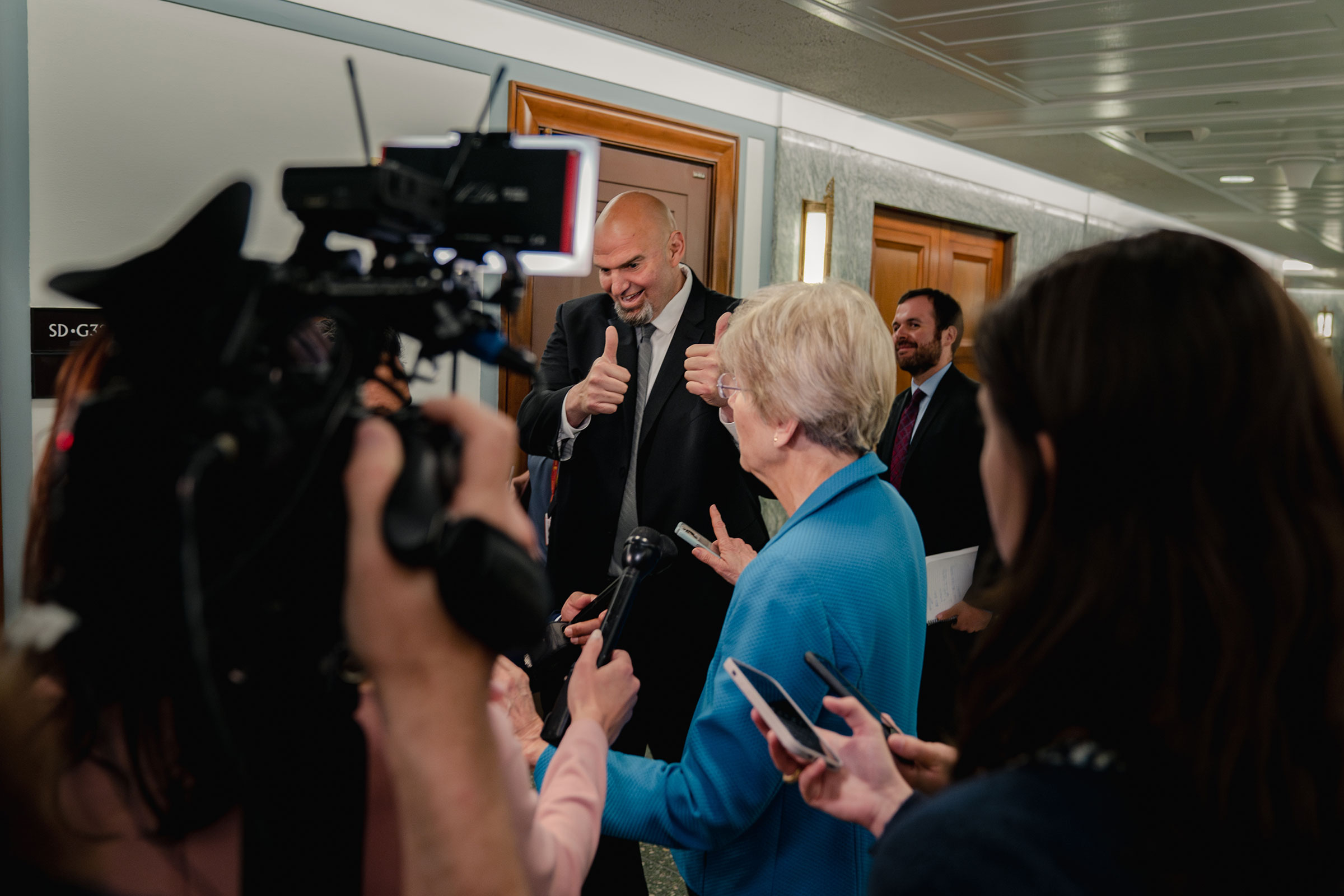
Fetterman began to venture outside, into the ward’s sunny courtyard. But he still refused to see his family until one day a staff therapist said something that flipped a switch. “The therapist, she’s like, ‘Hey, your wife and your kids want to come, what do you think?’ And I was like, no, no, the kids don’t want to see me. I ruined my son’s birthday. I haven’t been a participant in their lives for the last couple of months. And the moment that changed everything was when that young therapist said, ‘Kids need their daddy’s hugs.’” He chokes up at the memory of it: it was so simple, so clear, so suddenly obvious.
Gisele brought the family, and they picked up a packet of Post-it notes that Fetterman’s father had left to help him with his reading. In black ballpoint pen, they covered the neon pink, yellow, and blue stickies with pictures and messages: “We love you,” “Best dad ever,” “YOU WILL GET BETTER.”
Recounting this memory at the house in Braddock, Fetterman pauses our conversation and lopes back to the bedroom to retrieve the Post-its. There are more than 100 of them, preserved in a wood frame. “I’m going to save these till the day I die,” he says, crying. “Their visit was really kind of a pivot, where I realized that this is a choice. You have the support, you have the medical community, you have therapy. And this was a catalyst that helped direct me to the way forward.”
The final two weeks of his hospital stay were spent fine-tuning a treatment regimen. On March 31, he left the ward and went home to Gisele and the kids. On April 17, he returned to the Senate. Williamson says Fetterman’s depression is now in remission. “His prognosis is good,” the doctor adds, “provided that he continues to take his medication, and he’s very strongly committed to medication and treatment over the long term.”
The senator and his team never considered trying to hide the cause of his hospitalization at Walter Reed. “We were never for a minute going to say he was being ‘treated for exhaustion,’” Katz says. But they weren’t sure what the reaction would be when they first announced he’d been admitted. As they hit “send” on the press release, Jentleson and Calvello recall holding their breath and exchanging a here-goes-nothing glance.
They needn’t have worried. Lawmakers from both parties expressed support, in public and private. “Heidi & I are lifting John up in prayer. Mental illness is real & serious,” tweeted Texas Republican Ted Cruz. Tina Smith, the Minnesota Democrat, brought doughnuts to his staff, who were soon overwhelmed with similar gifts from Republicans and Democrats alike. Republican Senator Katie Britt of Alabama, Fetterman’s neighbor in the Capitol basement, was among the first colleagues to visit him in the hospital. (Though both have moved to better offices, their bond endures: crossing paths in a Capitol tunnel one recent afternoon, Fetterman yelled, “Alabama!” and gave her a fist bump.) “Unsolicited, so many colleagues have expressed both publicly and privately their appreciation that he did this,” says Democratic Senator Peter Welch of Vermont, who notes that the COVID-19 pandemic and its aftermath triggered a widespread mental-health crisis that the nation is struggling to address. “A lot of citizens have too. It was a powerful and a helpful thing that he did.”
Constituents flooded Fetterman’s office with messages of support. “Attached below is today’s call report,” reads the daily internal email tabulating constituent calls to his Washington office from Feb. 16, the day he went public. “Total number of calls: 56. Top call topics: 1) Well wishes for the Senator—32.” No other topic had more than two callers. That pattern continued throughout his hospitalization.
Williamson believes Fetterman’s openness about his struggles has the power to help countless others. In a recent Gallup survey, 18% of Americans said they have depression—a rate that has nearly doubled in the past decade. Studies have found that fewer than 10% of sufferers get psychiatric treatment. “We struggle in the health care world to message this condition to the public,” Williamson says. “People feel like losing their drive, their emotional repertoire, their passion, that these things are somehow an indictment of their personality or something that they’ve done wrong. If you get chest pains, most people know that’s bad and you’ve got to go to the ER. We need to get there with depression, and the way we’re going to get there is when public figures like Senator Fetterman speak out and say help is out there and you can get better.”
May 16, 2023: a normal day in the life of an abnormal U.S. Senator. In the morning, Fetterman meets with the CEO of Ikea; later, he will receive the family of an American held prisoner in Russia. The meetings will be awkward for all involved. Fetterman is still learning to navigate his limitations, and for the most part, he expects everyone else to adapt.
The day’s main event is a hearing of the Senate Banking Committee. The former executives of Silicon Valley Bank and Signature Bank, which failed in March and were taken over by federal regulators, are set to testify. Fetterman, the most junior of the 23 Senators on the committee, is scheduled to speak last. In his first-floor suite in the Russell building, his staff brainstorms ways to channel the righteous indignation Fetterman feels toward the executives—fat cats, as he sees them, who got off easy and left the little guy holding the bag. “None of the Democrats are being big enough a–holes to this guy,” Jentleson says as he watches the start of the hearing. They land on the idea of berating the former SVB boss, Gregory Becker, for jetting off on a Hawaiian vacation the same day he was ousted as CEO.
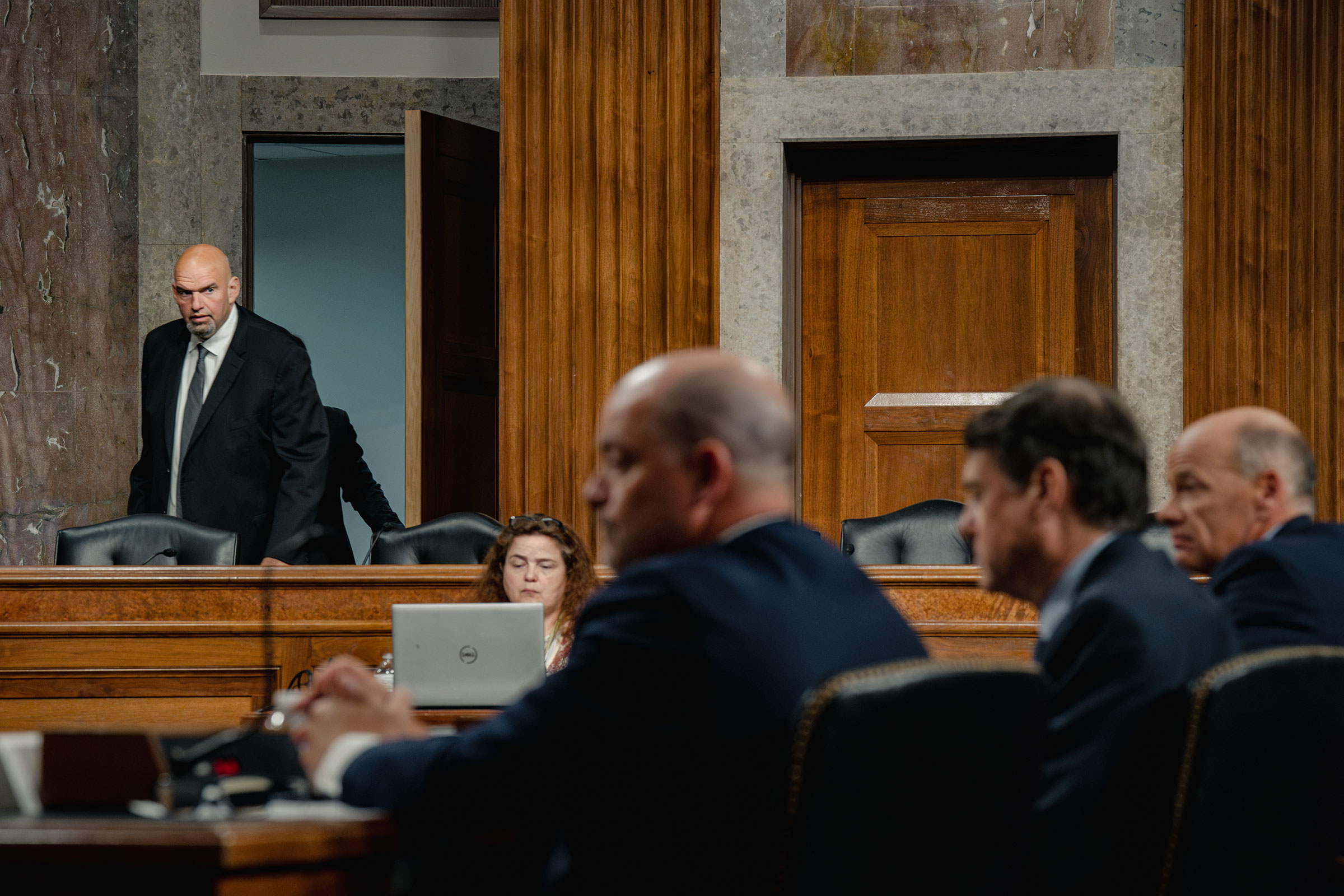
As the hearing nears the two-hour mark, Fetterman changes into a suit and heads through the Capitol’s winding underground passages. With his hulking posture and lumbering gait, he is impossible to miss, and he is repeatedly stopped for selfies. Other than that, he walks in silence. His body man, Luke Borwegen, holds the iPad in front of him, but the ambient hubbub has rendered it useless.
Shortly before his turn to speak, the plan goes out the window. Britt, the Alabama Republican, has also latched onto the Hawaii tidbit and is grilling Becker about taking the trip while declining to return his bonus. Fetterman has to come up with a new angle on the fly. He settles on a complex idea related to the debt-ceiling negotiations, in which some Republicans called for work requirements for recipients of the Supplemental Nutrition Assistance Program, better known as food stamps. If poor people have to prove they’re working to collect taxpayer-funded benefits, Fetterman wants to know, shouldn’t CEOs getting billion-dollar bailouts have to do the same?
That’s the idea, at least. But when Fetterman takes his seat and sets out to make his point, what comes out is less clear. “The Republicans want to give a work requirement for SNAP, for a hungry family has to have this kind of penalties, some kinds of word—working requirements,” he stammers. “Shouldn’t you have a working requirement after we sail your bank—billions of your bank? Because they seem to be more preoccupied when, then, SNAP requirements for works, for hungry people, but not about protecting the tax—the taxpapers, you know, that will bail no matter whatever does about a bank crashing?” The executives aren’t sure how to react. Dumbfounded or confused, they don’t answer.
By late afternoon, Fetterman’s questioning becomes the subject of more than 30,000 tweets. Some of them are from the left, celebrating the point he was trying to make. But the exchange really goes viral on the right, with critics mocking his inarticulateness. Fox News airs three segments on his performance. GOP Representative Ronny Jackson of Texas, the former White House physician, calls Fetterman “an absolute disgrace,” adding, “He’s completely incapable of doing the job he was sent here to do.”
Many on the right remain obsessed with the idea that Fetterman is, as Tucker Carlson once put it, “unapologetically brain-damaged.” Borwegen, the bearer of the iPad, went on a couple of Bumble dates with a woman who kept prodding him to admit that his boss was incapacitated, only to find out that she was actually an operative surreptitiously taping their encounters for the right-wing activist James O’Keefe. The video, posted in May, contains no such admission.
Once, these types of attacks would have sent Fetterman spiraling. Today he’s able to let the negativity slide. He’s no longer on social media. “So anyone who reads your article and thinks, Goddammit, I’m throwing my A+ material directly at John, the good news is, I don’t know what you’re saying!” he jokes.
The freshman lawmaker is beginning to carve out his identity in the Senate. He co-sponsored pending bipartisan rail-safety legislation in response to the February Norfolk Southern train derailment, which occurred just over the Ohio-Pennsylvania border. In May, he joined other Democrats in calling on President Biden to use the 14th Amendment to raise the debt ceiling unilaterally. The following month, he was one of five Democratic Senators to oppose the debt deal negotiated by Biden and House Speaker Kevin McCarthy, a vote that put him in the same camp as Bernie Sanders and Elizabeth Warren. “Honestly, I swear, I don’t consider myself a progressive,” he says. “I’m just a guy with three kids, and it scares me to death that a bank president 3,000 miles away can crash and blow up, like, my kids’ college savings or whatever. I don’t call that progressive. I call that an outrage.”
On a sweaty Saturday in June, the Fettermans line up for the start of the Pittsburgh Pride Parade. Gisele wears a rainbow-striped cotton sundress, while the Senator, clad in his usual work shirt and sweat shorts, has draped a full-size rainbow flag over his shoulders like a superhero cape. He had to miss last year’s parade, which was soon after his stroke.
A pair of Black women in matching rainbow jerseys approach and are enveloped in Fetterman’s embrace. A decade ago, as mayor of Braddock, he began marrying same-sex couples in defiance of state law. Princess and Judy Craighead were the first Black couple he married, and have stayed friends with the Fettermans ever since. “We wore dashikis at the ceremony, so he wanted to wear one too, so we had to find a dashiki in size 5XL,” laughs Princess, 57, who works in a restaurant. Judy, 65, a disabled Army veteran, says her elderly mother suffers from aphasia. “Same as him, the stuff you want to come out doesn’t come out right all the time,” she says. “But she’s still the same person.”

Other Democratic elected officials make a quick appearance and leave, but not Fetterman. He starts at the front of the parade but quickly falls back to the rear, stopping every few feet for selfies, hugs, and fist bumps. Young people squeal like they’ve just seen Taylor Swift. A stocky white woman in jean shorts buries her head in his chest. Diane DeGregorio, 58, is a Teamster who works on the loading dock of the nearby convention center. “I suffer from depression, but it’s not something you talk about,” she tells me. “Hopefully, with him admitting it and getting treated, it lets more people know that it’s OK to say you have a problem, especially men that look like him.”
After the parade, Fetterman settles into an easy chair by a window in the converted car dealership in Braddock that his family calls home. It’s a massive, loftlike space with exposed-brick walls, full of salvaged furniture and thrift-store finds. The three kids are getting ready to go to the pool. Two rescue dogs, Levi and Artie, roam the premises.
Fetterman, in his sardonic fashion, wants me to know he’s aware how cheesy some of his newfound gratitude sounds. “Like, you know, when I was getting out, I didn’t think, ‘Woo-hoo! I’m on top of the world!’” he says. “But, like, you have a life to live, and you’re excited to live those—that life. And knock on wood, every day has been wonderful. And now I have a duty to pay it forward. Because I’ll be honest with you, I would be scared where I would be right now if I didn’t have the kind of help that I got at Walter Reed. And it’s a shame that those types of resources are not available to everyone. But what is available is that I have a duty to be a champion of that.”
In retrospect, Fetterman believes that what happened to him was inevitable—that his natural melancholy would combine with the stroke and the “blowtorch” of the campaign to ignite his depression. While he knows many see him as diminished or disabled, he believes what he’s been through has made him stronger: wiser, more thoughtful, more appreciative. “I thought I was really empathetic before, but after the stroke, and then after this—I think it made me a much better Senator.” What he wants now, he says, is to be the voice that might have pulled him out of the darkness.—With reporting by Julia Zorthian
More Must-Reads from TIME
- Inside Elon Musk’s War on Washington
- Meet the 2025 Women of the Year
- The Harsh Truth About Disability Inclusion
- Why Do More Young Adults Have Cancer?
- Colman Domingo Leads With Radical Love
- How to Get Better at Doing Things Alone
- Cecily Strong on Goober the Clown
- Column: The Rise of America’s Broligarchy
Write to Molly Ball at molly.ball@time.com
